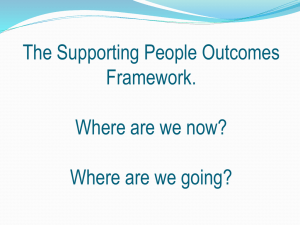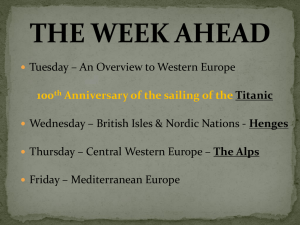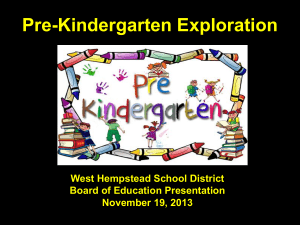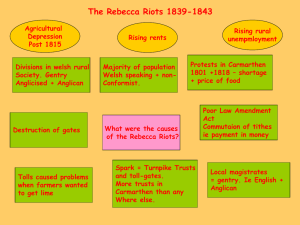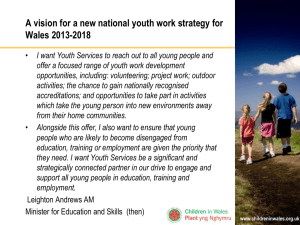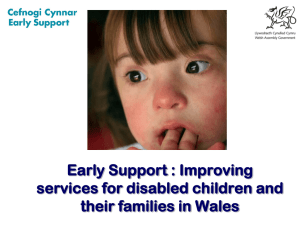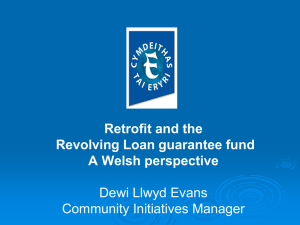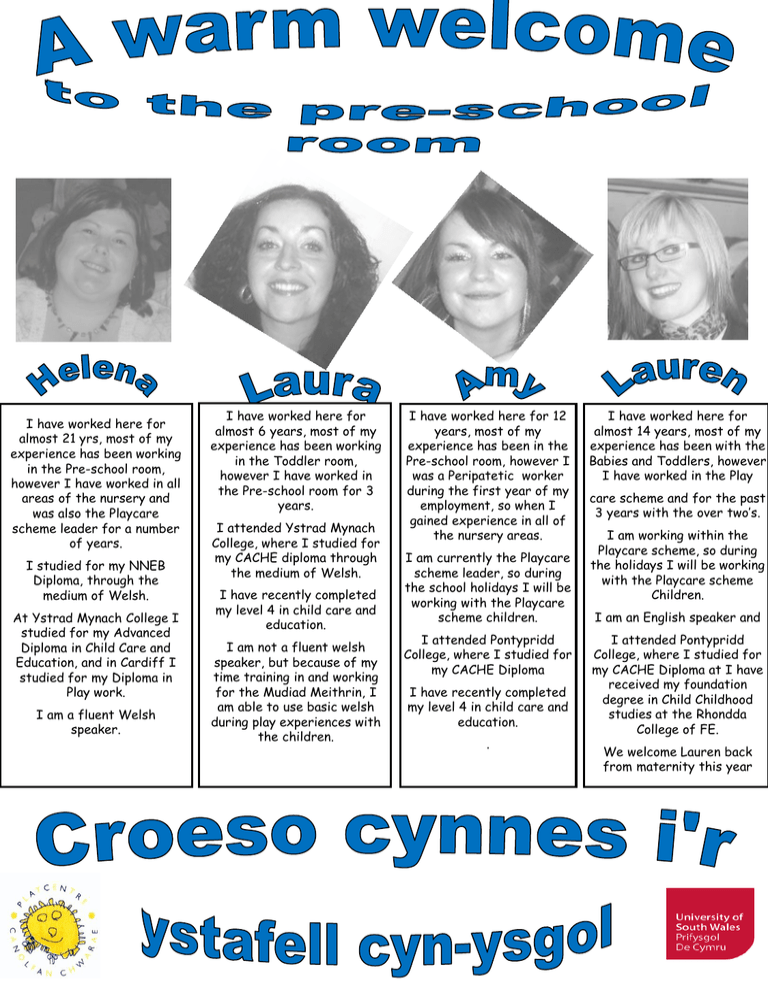
I have worked here for
almost 21 yrs, most of my
experience has been working
in the Pre-school room,
however I have worked in all
areas of the nursery and
was also the Playcare
scheme leader for a number
of years.
I studied for my NNEB
Diploma, through the
medium of Welsh.
At Ystrad Mynach College I
studied for my Advanced
Diploma in Child Care and
Education, and in Cardiff I
studied for my Diploma in
Play work.
I am a fluent Welsh
speaker.
I have worked here for
almost 6 years, most of my
experience has been working
in the Toddler room,
however I have worked in
the Pre-school room for 3
years.
I attended Ystrad Mynach
College, where I studied for
my CACHE diploma through
the medium of Welsh.
I have recently completed
my level 4 in child care and
education.
I am not a fluent welsh
speaker, but because of my
time training in and working
for the Mudiad Meithrin, I
am able to use basic welsh
during play experiences with
the children.
I have worked here for 12
years, most of my
experience has been in the
Pre-school room, however I
was a Peripatetic worker
during the first year of my
employment, so when I
gained experience in all of
the nursery areas.
I am currently the Playcare
scheme leader, so during
the school holidays I will be
working with the Playcare
scheme children.
I attended Pontypridd
College, where I studied for
my CACHE Diploma
I have recently completed
my level 4 in child care and
education.
.
I have worked here for
almost 14 years, most of my
experience has been with the
Babies and Toddlers, however
I have worked in the Play
care scheme and for the past
3 years with the over two’s.
I am working within the
Playcare scheme, so during
the holidays I will be working
with the Playcare scheme
Children.
I am an English speaker and
I attended Pontypridd
College, where I studied for
my CACHE Diploma at I have
received my foundation
degree in Child Childhood
studies at the Rhondda
College of FE.
We welcome Lauren back
from maternity this year
A very warm welcome to your pre-school room. We have written this booklet to
provide you with information about the room itself, the staff the routine of
the day and also about our early years curriculum which is vital to your child’s
development.
We have 4 key worker groups
Group 1 will be led by Helena Back.
Group 2 will be led by Amy Neal.
Group 3 will be led by Laura Capel.
Group 4 will be led by Lauren Cambridge
There a many reasons why having a key worker is worthwhile and important, we believe
that all children need to feel safe, secure and part of a group and having a key
worker enables each child to be treated and respected as an individual.
Our ratio of staff to children is 1-8, for the over three’s and 1 – 4 for the two
to three year olds, this gives us the opportunity to spend more time on an
individual basis, have excursions to enhance their knowledge and understanding
of the world in which we live and it also enables each child’s needs to be
catered for individually.
Whilst having a key worker is of great importance, we aim to encourage a family
environment, and siblings are welcomed to join in play with each other. Although
children are encouraged to integrate with their own peers during key worker
activities.
Every morning the over 3 children take part in Registration time.
During this time one group will discuss the day ahead – which may include any special
activities, what they would like to play with, the weather, day of the week, the
season, and the month. Our under 3’s will take part in a song time and sing a variety
of nursery rhymes and or our special puppets.
These sessions are valuable as it gives the children the opportunity to talk about an
item brought from home, recall a special event or simply share a rhyme with the
rest of the group. All of the above encourages a deeper knowledge and
understanding of the world, listening skills, decision making, turn taking, cooperative skills and self confidence.
At the Playcentre we sing a huge variety of songs, each room has their own rhyme book,
and we regularly share these books.
In addition to these songs we also sing a variety of songs introduced by our Dance
teacher, Pyjama Drama sessions, and also current themes and interests.
If you would like to know some of these please inquire with your child’s key worker.
The room is planned wherever possible to encourage self help skills, our toys and
utensils are easily assessable and clearly labelled with words and pictures enabling
your child to make their own choices, and link pictures of objects with words which
helps children understand that print has meaning.
For safety reasons, there are some toys and equipment stored out of reach of the
children, as we now have many under three’s within the area, however these will be
accessible during enhanced play time for the over three’s, and also used with the
under 3’s with supervision.
We encourage the children to dress themselves, wash and dry their own hands, use the
toilet independently, all children will be accompanied to the bathroom, and needs met
accordingly. We encourage parents/Carers to practice these independence skills at
home, in readiness for school.
Children are also encouraged to choose which activities they would like to
participate in on a daily basis. There is a range of art and craft materials available all
day, enabling your child to make individual choices, which will encourage and nurture
the children’s self esteem and confidence.
As a nursery we are working towards all staff being comfortable in the use of basic
welsh, Helena speaks welsh fluently, and Laura has a background working in the Mudiad
Meithrin. We encourage all of our children to learn key words, phrases and rhymes.
This is achieved by books, games, CD ROMs in the medium of Welsh, the opportunity
to sing Welsh nursery rhymes, using our tedi “TICW” and also during this is evident
during our planning process.
You and your child will also have the opportunity to participate in our reading club,
which gives you and your children an opportunity to borrow a variety of books. We
have called this our Be Enthusiastic About Reading club. (The Bear Club). If you wish
to participate in this scheme please ask your child’s allocated key worker.
We have very special friend called Zinga who enjoys building loving friendships with all
the children in the room.
We use this character to talk about being kind and cuddling with our friends, to
encourage the children to take turns, and to encourage language skills. You are
welcome to take him home on the weekends and write a story in our special book,
however please take good care of him and return him on Monday morning.
Because creative music and dance is invaluable to each child’s development, we provide a
variety of opportunity for creative music and dance. The children also have access to a
variety of musical instruments, and participate in rhyme time sessions regularly, where we
encourage the children to make up their own songs, and repeat well known rhymes too.
Once a week our dance teacher will lead a session, and once a month we have a visit from the
Pyjama Drama group.
The Healthy and Sustainable Pre-School Scheme has evolved from the successful
and well established Welsh Network of Healthy Schools Schemes. It recognises the
value of early interventions and aims to provide a structured framework for preschool settings and their communities to develop and integrate holistic approaches to
health promotion and wellbeing. The Schemes in Wales are funded by the Welsh
Government and managed locally by the Cwm Taf Public Health Team. Settings will be
supported by a Specialist Pre-School Practitioner working in partnership with Early
Years Providers and the Healthy Schools Team, and the strategic management of the
Scheme will be directed by a multi-agency Steering Group.
Last year we completed the first phase, this involved a focus on Nutrition, Oral
Health, Physical Activity and Active Play.
Currently our Focus will be Phase 2, which involves Mental and Emotional Health,
Wellbeing and Relationships and Workplace Health and Wellbeing.
rd
And the 3 and final phase involves focusing on the Environment, Safety and Hygiene.
As part of the Designed to smile initiative once a day we encourage the children to
brush their teeth, this is supervised at all times, and for the purposes of hygiene each
child will have their own brush at the Play centre, also the brushes will be housed in
our special tooth brush bus.
All staff at the Play centre have been trained by the Cardiff & Vale NHS Trust,
Designed to Smile Health Improvement Practitioner, and they visit monthly to ensure
quality practices ensue.
If you would like your child to take part in the supervised tooth brushing you are
required to complete the consent form.
We endeavour to complete this daily, but please ensure the children brush their teeth
regularly at home.
We aim to educate children about our responsibilities to look after our Planet, and
praise every effort no matter how small, initiatives we have introduced are – Water
butt in the garden to preserve water, Compost container to reuse leaves, plants and
weeds. Pingu our paper recycling penguin, Recycling areas inside and outside at the
centre, we dispose of these according to the recycling policy of the University, and
where possible produce works of art. We also teach the children about the benefits
of Fair trade products.
There are areas throughout the forest and university to recycle, and we also have a
food waste scheme with a local farm, to feed their pigs.
We have received our Bronze Eco school status and our aim is to continue, with your
help to push this forward, so if you are interested or have any ideas we would be
delighted if you can let us know.
The manager has completed a Level 3 qualification in Forest school training, to deliver
a fun and positive approach to outdoor learning .
“' A Forest School is an innovative educational approach to outdoor play and learning.’
The philosophy of Forest Schools is to encourage and inspire individuals of any age
through positive outdoor experiences.
By participating in engaging, motivating and achievable tasks and activities in a
woodland environment each participant has an opportunity to develop intrinsic
motivation, sound emotional and social skills. These, through self awareness can be
developed to reach personal potential.
Forest Schools has demonstrated success with children of all ages who visit the same
local woodlands on a regular basis and through play, who have the opportunity to learn
about the natural environment, how to handle risks and most importantly to use their
own initiative to solve problems and co-operate with others. Forest School
programmes run throughout the year, for about 36 weeks, going to the woods in all
weathers (except for high winds). Children use full sized tools, play, learn boundaries
of behaviour; both physical and social, establish and grow in confidence, self-esteem
and become self motivated.
Forest Schools will aim to develop: Self Awareness/Self Regulation /Intrinsic
motivation /Empathy /Good social communication skills /Independence /A positive
mental attitude, self-esteem and confidence.” More information is available at www.forestschools.com
Because creative music and dance is invaluable to each child’s development, we provide
a variety of opportunity for creative music and dance. The children also have access
to a variety of musical instruments, and participate in rhyme time sessions regularly.
Once a week our dance teacher will lead a session, and once a month we have a visit
from the Pyjama Drama group.
We have an all weather policy in which we feel it is imperative for the children to
experience quality outdoor play and fresh air during the day. Therefore, parents are
encouraged to provide appropriate clothing for the weather, hats, gloves, coats or
jackets & wellies for cold, rainy days. Also, sun lotion, towels and swimming equipment
on sunny days as fun is a high priority with the children’s favorite being the swimming
pool. We have a special pod area, these are used to extend the classroom environment.
Housed under the pod are our Schema boxes, these contain a variety of equipment and
materials, which encourage the children explore and experiment with, and freely
allows each child to follow their choice of patterned linked behaviours. Some of these
patterns include enclosing and enveloping, transporting, connecting, trajectory and
rotation.
(Our outside area is designed to lessen the risk of a serious injury, however when this
becomes wet it can stain clothes and shoes, so please ensure suitable
clothing/footwear is provided.)
The themes for the pre-school room are based around stories or rhymes, this is
to give the children an opportunity to understand a story in detail, the stories
this year will be Amy will plan for the theme Big Red Bath. (Taking care of ourselves)
Helena will plan for the theme Goldilocks and the three bear. (Looking after our
Environment)
Lauren will plan for the theme Down in the Jungle (Different environments).
Alongside these themes Laura will plan to celebrate a variety of festivals and
important holidays, if you have any special requests, please let us know.
Within the room we have a Planning wall, this will give you an in-depth insight into
the planning for the current term, here you will find our medium term plans for
each of the 7 statutory areas of the Foundation Phase, our routine of the day,
our weekly plan, enhanced plan and our continuous provision sheets, which will
ensure the basics are constantly available with planned enhancements to ensure
the areas are changed regularly to make them more challenging and attractive to
the children.
Copies of our medium term and short term plans can be viewed on the planning wall in
the pre-school room. Individual planning also takes place on a termly basis,
whenever staff observe a milestone, observations are written in your child’s
personal profile.
There will be another planned session for the over 3’s after the lunch period with
initiatives such as Busy feet, and Adventures in Food land, which are part of the
healthy and sustainable pre-school scheme,. At this time we also implement as
mentioned earlier “Tedi Ticw”, and Play to Learn an initiative in accordance with
the Sports council Wales, Health Challenge Wales.
If your child misses out on some activities and you wish to have a copy of the weekly
planning, in order for you and your child where appropriate to complete the activities
at home, Please feel free to ask a member of staff and a photocopy can be made for
yourselves.
We want to encourage you and your family to be fully involved while your child attends
the Play centre, so if you have any ideas or suggestions regarding the following theme
or if you would like to become involved in some form, do not hesitate to approach us.
If you would rather please feel free to place a sticky note on the Parent board in the
room.
As of September every child will have focused individual plans designed termly, this will
ensure that the children's interests are taken into account, and that they take an active part
in their development. Alongside their key workers they will discuss the types of activities
that will encourage scaffolding of the 7 foundation phase areas of development. Meeting to
discuss these and your child’s general development will be scheduled termly.
Each child will be given a hanger in the room for their coats; however as space is
limited part time children may have to share with others, so please take them home
daily. Another hanger will be provided in the bathroom area, you may wish to provide
an extra set of clothes for your child and sun cream and hat in hot weather.
If your child is in nappies or in the process of toilet training please provide nappies,
wipes and cream, and a few changes of clothing is essential. A guide to assist you in
potty training can be obtained by talking to your key worker.
Your child will be given a personal drawer, here any information you may need, and
special presents from your child will be placed, we encourage the children to use these
as a form of communication to one another, so your child may receive a special hand
delivered letter from a friend, again please check at the end of each day.
Please could you label all of your child’s personal belongings to enable us to identify
them easily.
Please ensure children clothes are suitable for a busy/messy nursery life as children
will have open access to art and craft activities – whilst we try to protect your child’s
clothing accidents may happen.
Information regarding your child’s day, how much they ate, what they have achieved
etc, is written daily and is displayed on the front of the Pre-school room door at the
end of the day. If you wish to copy this information onto a slip please feel free to do
so, on the slips provided.
Our menu board is situated in the foyer with information about what healthy foods
we’ve eaten throughout the day.
We discourage the use of bottles at all times, and only use dummies when absolutely
essential, eg. Sleep time or when having a cuddle if upset. If possible do not bring
them into nursery.
In our bid to provide up to date quality education and care, we will continue the
implementation of the Foundation Phase, and use the Child Development Profile as a
scaffolding and assessment tool.
”Children learn through first hand experiential activities with the serious business of “play”
providing the vehicle. Through their play children practice and consolidate their learning, play
with ideas, experiment, take risks, solve problems, and make decisions individually, in small
and in large groups. First hand experiences allow children to develop an understanding of
themselves and the world in which they live. The development of children’s self image and
feelings of self worth and self–esteem are at the core of this phase.”
The above extract was taken from the document (The framework for children’s learning in
the foundation phase.) a copy of this document is available to view on the parent information
board in the foyer.
The above statement is nothing new to us at the Play centre, as my colleagues and I have
“taught” using this approach for many years, treating each child as an individual, and ensuring
the child’s self image, confidence and their learning experiences are enriched.
More information surrounding the foundation phase and how we plan to implement this can be
found in the office.
If you would like a copy of the Foundation Phase document, you can contact the Welsh
Assembly Government by the following web address -www.wales.gov.uk
Our adopted ethos - Children Learn What They
Live
If children live with criticism, they learn to condemn.
If children live with hostility, they learn to fight.
If children live with fear, they learn to be
apprehensive.
If children live with pity, they learn to feel sorry for
themselves.
If children live with ridicule, they learn to feel shy.
If children live with jealousy, they learn to feel envy.
If children live with shame, they learn to feel guilty.
If children live with encouragement, they learn
confidence.
If children live with tolerance, they learn patience.
If children live with praise, they learn appreciation.
If children live with acceptance, they learn to love.
If children live with approval, they learn to like
themselves.
If children live with recognition, they learn it is good
to have a goal.
If children live with sharing, they learn generosity.
If children live with honesty, they learn
truthfulness.
If children live with fairness, they learn justice.
If children live with kindness and consideration, they
learn respect.
If children live with security, they learn to have
faith in themselves and in those about them.
If children live with friendliness, they learn the
world is a nice place in which to live.
©1998 by Dorothy Law Nolte and Rachel Harris
The poem “Children Learn What They Live”
©Dorothy Law Nolte
Used by permission of Workman Publishing co., New
York All Rights Reserved
Our
aims :-
To ensure a
sensitive
and confident
transition
from nursery
to school
.
To encourage communication
skills through all forms of
artistic expression.
To assist in
your child's
personal
hygiene and
toileting skills,
in conjunction
with home
support.
To provide an atmosphere
where each child can develop a
sense of security, warmth, love,
and affection in order that they
can feel valued within an equal
environment.
To provide a strong
sense of security
based on
contentment
and trust
Promote a positive and
fun attitude to learning
Develop an
awareness of the
needs of all
living things.
To encourage independence
and a
sense of responsibility.
To provide a soft
homely corner with
floor cushions for rest
time and for reading &
playing quiet games and
activities.
To encourage an understanding and
appreciation of the Welsh language and
heritage, and the heritage of other
cultures in our society.
To provide a wide range of activities
that encourage and enhance active
learning
To provide
each child
with the
time and
opportunity
to interact
with his/her
peers and
adults.
At the end of your child’s experience in the pre-school room, an in-depth personal
developmental book will be completed by your child’s key worker. This is a record of your
child’s development in the seven statutory areas of Learning in the Foundation Phase, and
will be filled with pictures and observations of your child's time at the Playcentre.
A record form called “On my way.” will be sent to the school or setting your child will be
attending, along with a letter giving contact details of the Playcentre, with an invitation to
discuss your child’s development further, if they so wish. We suggest that your child’s
individual profile be shared with the school, as this holds valuable information that will
assist your child’s continuous progression.
We hope that you feel safe in the knowledge that:“We will love, while your child learns”
We operate on a open door policy at all times, If you wish to discuss your child’s development
in detail or rearrange your termly meeting, we will endeavour to make a convenient
appointment. Kindest regards,
Helena, Amy, Lauren and Laura.
Goldilocks and the three bear
- Helena to Plan
____________ & Christmas
Amy to plan
Sep
Down in the Jungle
Lauren to plan
October
Novembe
r
Decembe
r
January
February
March
April
May
Week
1 – 2nd
CDP
Week 1
– 1st
Week 1
– 4th
Week 1
– 2nd
Christ
mas
Plan.
Week 1
– 6th
CDP
Week 1
–
3rd
Week 1
– 3rd
Week 1
–
7th
Week 1
5th
CDP
Week
1 – 2nd
Week 1
– 7th
Week
2 – 9th
CDP
Week 2
– 7th
Week 2
– 11th
Week
2 – 9th
Christ
mas
Plan
Week
2
- 13th
CDP Tu
Bishvat
Day
Week
2–
10th
Week
2 – 10th
Week
2&3–
14th&
21st
Term
ends
Week
2 – 12th
Week 2
– 9th
Week
2 – 14th
Week
3–
16th
Week 3
14th
Week 3
– 18th
Week
3 – 16th
Christ
mas
Hanouk
kah
Plan
Week
3–
20th
Week
3 – 17th
Week
3
17th
Week
4- 28th
CDP
Week
3 – 19th
Week 3
- 16th
Week
3 – 21st
Week
4–
23rd
Week 4
– 21st
Divali
Week
Week 4
– 18th
Christm
as Plan
Week
4–
23th
Term
ends
Week
4–
27th
Week
4–
24th
Half
term
Week
4–
24th
Week
4–
26th
Half
term
Week 4
– 23rd
Week
4–
28th
Eid alFitr
week
Week 5
– 28th
Half
term
Hallowe
en
Week
5 – 25th
Christm
as Plan
Week
5–
30th
Week
5 – 31st
June
July
Week 5
– 30th
6 Week holidays July 21st & 28th and all August – Laura and Helena to Plan
Welsh Culture Plan Laura to plan – Term 1 – Icons Term 2 Main Festival s celebrated this year - Divali – Christmas – Tu Bishvat, Chinese New Year,, Eid al-Fitr, and Tu Bishvat, - for
others see Festival wall. Laura to Plan.
Seasonal fruits to taste - Laura to plan - Autumn – Winter – Spring – Summer-
Tropical fruits to taste – Laura to plan- Autumn – Winter – Spring – SummerKey - CDP – Child Development Profile assessment.

